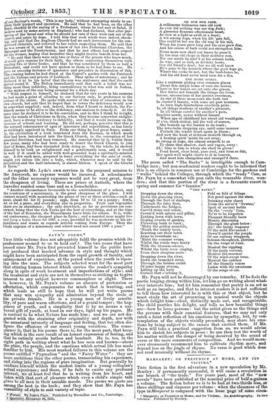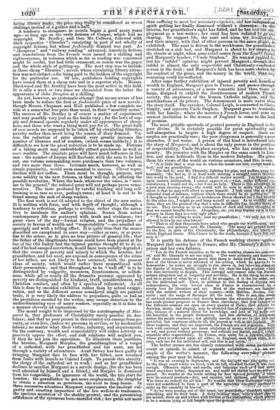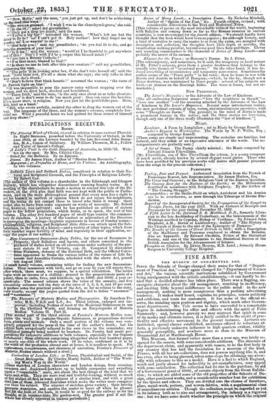MARGARET; on PREJUDICE AT HOME, AND ITS VICTIMS.'
THIS fiction is the first adventure in a new speculation by Mr. Bentley : if permanently successful, it will cause a revolution in one branch of "the trade." For years past, most of the "new novels" have been published at the nominal price of halta-guinea a volume. The fiction before us is to be had at two-thirds less, or three shillings and sixpence per volume : when the closeness of the type inlfargatet is compared with the loose page of some Giros- * minaret; or Prejudice at Home, and its Victims. Au Autobiography. In two volumes. Published by Bentley. lating ,, s it FfiIl considered as seven shillings instead a , 431M4Wia% A tendency to,oheaperesein,sesire lisped many years ago—so long ago as sthe early fictions of .1Ceeper, which had no copyright. Mr. Bentley, and then Mr. Colburn, followed with their respective "libraries "; consisting in part if not wholly' of copyright fictions, but whose fashionable demand was past. As " cheapness" and "railway reading" advanced, American fictions and translations from the French were issued at a shilling and eighteenpence, in volumes which as far as reading was concerned might be useful, but had little ornament, so coarse was the paper and the whole style of getting-up. The next step was to include in those cheap " libraries"; novels whose circulating library attrac- tion was not extinct; a fee being paid to the holders of the copyright for the particular use. Of late, publishers holding copyrights have issued them at a cheap rate and in a superior style. Messrs. Blackwood and Mr. Bentley have been the most active in this field. It is oily a week or two since we chronicled from the latter the appearance of John Drayton at a shilling. As yet, however, no systematic attenipt that we,are aware of has been made to reduce the first or lasliionabie price of new novels ; though Messrs. Chapman and Hall published a few complete no- vels at a somewhat less price than usual, in their "monthly series." The success of Mr. Bentley is of Course a matter of experiment, and may possibly vary just as the books vary ; for the laws of sup- ply and demand operate regularly ender all a.ppearancei-of cheap- ness, and those who want a thinginust pay for it. The great bulk of new novels are supposed to'be taken off 14 circulating libraries, novelty rather than merit being the source of their demand. 'Un- less the reduction of price should very greatly increase the number of libraries and of readers, (which seems• unlikely,) it is difficult to see how the great reduction is to be'made up. Fictions of a taking merit may undoubtedly attract puichasers 'as well as mere readers. The absolute price will hare much influence in this case : the number of buyers will finctuate with the sum to' be laid out, one volume commanding,more purchasers than two volumes, and two more than three. Intrinsic merit; however, as well as simple popularity, would seem-essential to success. Clever repro- duction will not suffice. There must be thougb.t..„ .purpose, and some solidity in the new fictions, or they will fail in effecting the possible revolution. Where the hook, whatever the value, is." cavi- are to the general," the reduced` price will not perhaps prove remu- nerative. The taste produced by careful teaching and long self- training is as rare as avers perhapa,rarer; at least it is not to be found among 'the mob of .cheap readers. The first work is not ill:adapted to the object of the new series. It is written with force, and with depth of thought ; although a tendency to refleetion, perhaps to writing, rather stops the narra- tive to inculcate the : author's opinions. Scenes , from 'actual contemporary life are portrayed with truth and vividness; two great vices of the day--formal religion, and the prejudices of society in favour of wealth and "respeetahility "-are assailed un- sparingly and with a telling effect. It is'quite true that the scenes described are exceptional in some Way—either sp rare, or so pecu- liar to the actors, as to give no true picture a. general life ; that the father of the illegitimate heroine could have been. placed at the bar of the Old. Bailey had the' injured parties thought fit to do so, and if he had escaped conviction, would have been socially degraded ; that the scenes of poverty and mice r'y to which the heroine; her
grandfather, and her aunt, are * *consequence onsequence of the crime of her father, are not likely to have occurred, with the present ideas of society; 'which would ' rather 'have sympathized with their persecution ; and that throughout, to be well oft" is to be distinguished by vulgarity, meanness; licentiousness, .or 'Selfish- ness, while all or nearly all the dramatis 'personae oppressed by poverty are distinguished for kindness, truth, considerateness, real Christian conduct, and often by a species of refinement. As all this is done by onesided exhibition rather than by actual exagge- ration, and as the different scenes considered singly are painted truly, it is very likely the address to prejudices, quite as bid as the prejudices assailed by the writer, may-escape detection by the undiscriininating eyes of many readers, especiallyas it is done in a manner cleverly ad captandum.
The moral sought to be impressed by the autobiography of Mar- garet is, that professors of Christianity rarely practise its doc- trines; and that no poor person in this conntry'can emerge from po- verty, or even live; (unless we presume in service, or by mechanical labour,) 110 matter what their.virtue, industry, and acquirements. On the contrary, wealth and respectability will either actively 'or passively oppose the effort, and, rich relations will neglect you, if they do not join the opposition. To illustrate these positions, the heroine, Margaret Marples the granddaughter of a verger of a cathedral, with her grandfather, .and her aunt, are led thrOugh'a -variety of adventures. Aunt Betsey has been guilty of bringing Margaret face to' face with.'her father, now returned from India with laurels as Colonel Leigh. To punishthis atrocity, the clergy of the cathedral set to work'; and as her grandfather declines to saerifipeMargaset as a servile drudge, (for she has been well educated by himself mid a friend,) old Marples is dismissed from his vergership. In ignerance of the world, the trio start for London ; the grandfather to get some employment, .therdapgliter to- obtain a situation: as :goterness,. the Bunt to,keep limas- three suesessive,situations Margaret experiences therinsolent vul- itlidtoractingslmPosition of thestiw well-to-do tradesmen, rftedopretit: 'of "the shabby' utiels:arof the patronising 'al 6 epiecretikletiae-rno h ;thergalnii netmore
than sufficing to meet her necessary expenses, and' spirit getting her finally dismissed Without( 'a dhorreatessisch sass
interim, her grandfather's sight has 41,1, ployment as a law-writer ; her aunt 11.406,Piro y charing. To support life, the aunt alitt;ssi-cAstry's and their misery, with that of other personiSats theriemea exhibited. The aunt is driven to the workhouse, the)griludfietkde • stretched on a sick bed, and Margaret is .titiont.tO Arpittygiirifixa. and Margaret's teacher, "Uncle Stephen." Be wasinotiipplig the streets at night, when some relief comes from the'faley,Ittitrt lest his " infidel" opinions might pervert MargaretalAW4battis, infidel is almost the only respectable and Christitualymenditeted. person in the book ; and Margaret's faith has been n• the conduct of the pious, and the misery i We' '1411 "
1st's, reasoning could haveeffected.
14 After some further exhibition of injured 43 ' pov r ea QBX ass,
1.! Fr`
wealth in England, Margaret goes to France ; and passeallirougl a variety of adventures, of a more romantic hind than those at home, designed to exhibit the licentiousness of modern French society, the emptiness of the Roman Catholic religion, and the machinations of its priests. The denouement is more outre than the story itself. The ravisher, Colonel Leigh, is converted to Chris, tianity, and converts Uncle Stephen. Margaret goes to Australia with -her family ; where she marries a French lover, and pens an earnest invitation to the women of England to come to the laiid of promise.
The most pitiable spectacle of genteel poverty in England is the poor divine. It is certainly possible for great spirituality and self-abnegation to inspire a high degree of respect._ .Sucli 'ex- amples are practically rare; the poor clergyman is generally &poor character, if not worse. A person of this kind is introdnced into the story of Margaret, and is about the only person in the' position of respectability, Uncle Stephen excepted, who has hu- manity. He journies with the Marples on the same coach.to don, and alone befriends them in the modern Babylon., -41e,gives them his views of the world on various occasions 'and tlfis " 'It is little that a man can do when his hands arei.'lifSd,,,a..i.,s'e,ox7defVowtiterii,01 in
God,' said my grandfather. .
"'The fact is,' said Mr. Chaundy, lighting his pipe, 490 au ikw se- hemenfly, ' the fact is, it is hard work steering s s • 411 this world to the next. I find it a difficult matter nifsb hat, upon mature deliberation, I cannot approve of,--Ns cumstances, I would not do,-but I see no help.:14 himself. miler 47 Ls Lpoouotriltn:111a steeringay7vreol113. wrong—theto v:prlat will vidential kind of defence, without which there would - I thought so hardly of myself as Archdeacon Dixon 'she* ; do the other day, I might go and hang myself at onedZ- tions, they are the greatest clog that a man in ditfieelty no use. They envelop us in an atmosphere of 6'1(4 that we cannot breathe freely. Altogether, sir, you ma poverty _in these days is a very ugly affair.'
" We are all willing to work,' said my grandfather ; allowed to live by our own labour.' " That is all that thousands have asked who people °in:- madhouses, and prisons,' said Mr. Chaundy. The matt
for the few, in spite of the Christianity, the philanth.' rif, which England boasts. This I know to be the truth, be .1acid
seen it:
It is partly his defence of the French workingVitikiSS rest Margaret that carries her to France, after Mr. Cha h in prison and her own failures. .s19.
" You do the French injustice, so far as the working_filaaseaarniencem- ed,' said Mr. Chaundy to me one night. The very auclacitsnifiergeness of their occasional outbursts prove that there is noble stenssilsessis, The man of the blouse is never ashamed of his calling, which, ba,--iin,qw**o be honourable ; he makes no struggle to rise above it, bkit.trik.e* the dignity of labour, boldly claiming for his class the hials.plisigirew. few dare outwardly to dispute. This intrepid self-respest hf#8111444Mts artisan altogether out of vulgarity and servility. Re is the thissilsasessirs and he is proud of what he is ; and if he struggles, it is foe,his 1**,5114 - for his individual self. Then, in addition to this feeling And.:::zad independence, the very lowest class in France is char-rietAl strong love for literature and art. Most of the jworkutensov with the noblest writers of their country—lvith Molnlre, ARaciriftv... neille ; and the songs of Beranger fill the land. This fs%nek„gkeigieou4... of. outward circumstances,—not merely because the ed_ue4enAt erfple has made greater progress in France than elsewhere,,,,- amt "1 the different sciences are open in every quarter of TO*, drawing, music, and singing, may be attended free °Tome rily, because of a natural thirst for knowledge, arid0,, the beautiful in the people themselves. And..thif„ 114.1 makes the people courteous ; not pitifully weir,_; a powerful, but courteous alike to all, the poorest. these respects, and they are important) the FO &laic look with contempt upon our mean adulatieii mum, or wit, and power without greatness; and n p;our s • s. scramble after respectability. In France, mea,.40-447. whose glory is reflected _upon- all alike ; in EnglanOom true, each one for his individual self, and this is net RI ila_ano
The better scenes are too closely conneoted,w., aingasnar4.eigst!
event or episode to admit of separate .exhibitimiqsa swot.- ample of the writer's manner, the- following -etnr)i- among the poor may be taken. • itorm'S "It was an evening in September, and the daylight In the dingy court where we lived, with its. tail, -crowd enough. Offensive sights and smells, and heard anywhere before, disgusted me, and hi BS passed. No wonder at the world setting its .fao were its natural products—dirt, and squat& 3ififtl Was there no remedy for all this No w' were not considered to form a part of 'thdl make up the assembly in heaven ! " As we were passing- But' the'court, any sotnethisig, And we drew h dirty-ko his moil* ire si andIrie • to be a woman lying at fullientilli* .189qqa VAg9711
Mea, yegiat
4i 0 you just get up, and don't be a-blocking
evnee.:44nt:
up llbY 4abooshmattatsessArefb c'F!wists I was in the churchyard-grave,' she said. apA $akedAnt ern/father.
tpoptieh; said the man.
44, /1"1Zielinied the woman. 'What's left me but the driti I& on *et it. Holy mother! how they forget me up
ogient ISOI se Viiiit tritr Witt's ! '
Y ttsbelifsloself ,said my grandfather ; 'do you feel fit to die, and go int the Poll ur God ' out o t r be a corpse this blessed minit ? ' it' llfkilfithe woman ; would'nt I be thankful to get anywhere 44( n Catholic ?'
s:ti ad that !I:balk-blessedbe God !'
sins there'll° lime to look after this poor creature ?' said my grandfather, addeetsiPalit-*0- " Nils ll.he looking arter her, if she don't take herself off,' said the nuut.tLoableas'yon, it's all a sham what she says; she only talks in that way when she ',0 drunk.' 44 Diet believe that black heretic!' screamed the woman ; 'the curse of
st. Petrick lightms '
wornen, and rew back, shocked and bewildered. "ft wasimperitiAti ,to,,pass the narrow entry without stepping over the "1 Them Trikh,' Miidthe man, 'is the only ones about us as talks about re- ligion; it don't seem to do 'em much good : they can curse the heretics. Xi a queet start, 'is religion. Now you just let the gentlefolks pass. Here, Bilk lend us a hand.' "Bill, who swore awfully, assisted the other to drag the woman out of the way. The language of the three, and the woman's screams, completely hor- rified me. What a peaceful home we had quitted for these scenes of turmoil and deep Annie!"




























 Previous page
Previous page